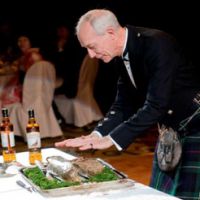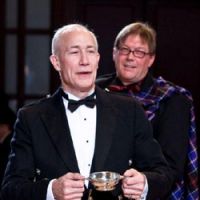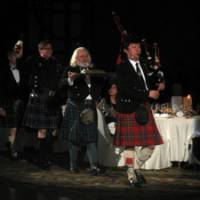The Scots language used in the poems and songs of Robert Burns may make them inaccessible to some, but their message of friendship and celebration remains universal nonetheless.
Burns, Scotland's greatest poet, was born the son of a farmer in the village of Alloway on Jan. 25, 1759, and died just 37 years later having crammed enough into his short life to leave a treasure trove of work still loved the world over.
While St. Andrew's Day — Scotland's official day — has its place in the calendar, it is the anniversary of Burns' birthday that really captures the nation's imagination.
The Burns Supper festivities follow a strict format that has changed little since they began at the end of the 18th century, and give a classic taste of Scottish culture and the work of Burns himself.
The large Scottish diaspora around the world means the event finds a home in all corners of the globe, and Japan is no different.
The international nature of the St. Andrew Society of Yokohama and Tokyo was evident at the Burns Supper held on Feb. 21 at the ANA Intercontinental Hotel in Tokyo, where those present enjoyed traditional Scottish food, drink and dance, as well, of course, as the poetry and songs of the man himself.
On the 250th anniversary of Burns' birth, society membership secretary Andrew Dunlop was pleased to welcome guests of a number of nationalities to the celebrations.
"The society is about cross-cultural exchange between Japan and Scotland, and the objective is to promote Scotland in Japan to Japanese people," he said.
"All sorts of people come along. We have a large Japanese clientele, and there are quite a lot of foreigners from all countries who have contacts or relationships with Scotland or are of Scots origin. But there is no limit. We welcome anybody who wants to come and enjoy and participate in our events.
"This year we have two charities. We have Second Harvest, which provides food for homeless people in Japan, and for a Scottish youth charity in Scotland."
The evening began with a word of welcome from the society's chieftain and emcee for the evening, Phil Gibb, before Gavin Catto recited the "Selkirk Grace" to give thanks for the meal about to be served.
And, of course, no food is more iconic of the Burns Supper and Scotland itself than the haggis, a dish made from mutton and spices boiled in a sheep's stomach.
The dish was brought into the hall accompanied by a piper from the Tokyo Pipe Band, whereupon it was serenaded with the "Address to a Haggis," Burns' famous ode to the "great chieftain o' the puddin' race," read by Frank Hunter.
After the feast it was time for the "Immortal Memory," a speech remembering the life of Burns delivered by the hotel's general manager Fergus Stewart.
There was then a humorous "Toast to the Lassies" given in honor of the ladies (and all other guests) by David Fitton, before Lori Henderson gave a reply to the men with her "Toast to the Laddies."
Andrew McGarva then fired up his ceilidh band, Coila, to lead the floor in a series of traditional Scottish dances including the "Gay Gordons," "Strip the Willow" and the "Dashing White Sergeant," before the night finished with the familiar refrain of Burns' classic "Auld Lang Syne."
Also making an appearance was the Tokyo Scottish Bluebell Club — a Scottish dance group consisting of Japanese performers.
One of the Bluebells, Harumi Makino, was quick to acknowledge the enjoyment her interest in Scotland and its culture has given her.
"I learned Scottish dancing at university when I was dancing with the international dancing group," she said. "I knew about Scotland before, and I also used to do a lot of classic ballet. I thought they were quite similar but actually it's not true.
"This event is a little different from every year because the society has combined the St. Andrew's Ball and the Burns Supper. Our group just had its 25th anniversary last year," Makino said of the Bluebell Club. "And as far as I know some of our members have danced at the ball every year since this group started."
The St. Andrew Society in Japan is the oldest "loyal" society in the country — a nonprofit organization that collects money for charity — and was started before similar societies representing England, Wales and Ireland. Although there is some debate over the exact date of its foundation, most agree the society is now over 100 years old.
Naturally, the society has many members from Scotland or of Scottish ancestry, but there are no restrictions on who can join.
The membership system has given way to a mailing list for events such as the Highland Games, informal barbecues and dances, and Japanese who have lived in Scotland or simply have an interest in the country and its culture make up many of the 1,300-strong participants. Signing up for the mailing list is free.
For more information see: www.st-andrews-society.com/
























With your current subscription plan you can comment on stories. However, before writing your first comment, please create a display name in the Profile section of your subscriber account page.